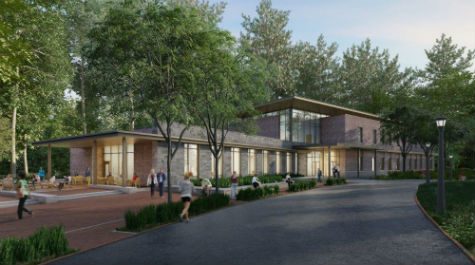Last week, students at the College of William and Mary donned purple garments to commemorate National Suicide Prevention Week, which annually seeks to highlight mental health issues. Throughout the week, the Counseling Center hosted a series of events highlighting and evoking discussion around common conceptions — and misconceptions — of mental health and suicide.
Beginning Monday, Sept. 9, and continuing through Friday, Sept. 13, students filtered in and around the lawn of the McLeod Tyler Wellness Center, writing messages on flags that were stuck in the lawn outside. By the week’s conclusion, students produced 1,100 purple flags, representing the number of college students in the United States who die by suicide annually.
“I think that this visual display gives a more tangible reality as to just how drastic the stigma of mental health has grown through the years,” Brooke Lamoureux ’23 said. “Seeing all of the flags filling the lawn really shocks you. It took me a while to process, when I first saw the flags, that this is our reality and it is truly up to us to make the change and I think that’s going to start with the erasure of stigma in mental health.”
Following suit, the Wellness Center invited the student body to unify themselves by wearing purple last Tuesday, Sept. 10.
“Yet again, the jumbles of purple masses on campus opened my eyes to the changes we are already beginning to make,” Lamoureux said. “It’s encouraging, really, and makes me proud that I belong to such a special student body.”
“Yet again, the jumbles of purple masses on campus opened my eyes to the changes we are already beginning to make,” Lamoureux said. “It’s encouraging, really, and makes me proud that I belong to such a special student body.”
Alongside the special events hosted by the Counseling Center, the Wellness Center sent out promotional material offering support, tips for managing stress and self-help links. The Center also offered help in connecting students to local psychiatrists and therapists on and off campus.
“While there is plenty of support on campus for students to access, we definitely want all students to feel like they have the opportunity to go elsewhere for help,” Julia Bland ’20 said. “No one should ever feel like they are out of options. Here they can write referrals, connect you to transportation and offer help using the off-campus provider database.”
“While there is plenty of support on campus for students to access, we definitely want all students to feel like they have the opportunity to go elsewhere for help,” Julia Bland ’20 said. “No one should ever feel like they are out of options. Here they can write referrals, connect you to transportation and offer help using the off-campus provider database.”
Aside from traditional methods of transportation like Uber and Lyft, the College offers programs like Zipcar and TribeRides to off-campus psychiatric and counseling appointments. For referrals to psychiatrists or psychological testing, students will need to go through the Mental Health Services Coordinator.
This year, Supportive Workshops held by the Counseling Center have aimed to enrich a community of mental health support.
Some workshops currently being held by the Center include Beating the Blues, Introduction Managing Anxiety and Relaxation Sessions. While all workshops promote student well-being, individually they tackle specific struggles while offering coping mechanisms and insight on a mixture of common issues.
“When you come to William and Mary, you bring with you what you left your home with, but here, the Tribe becomes your new support system and family,” Bland said. “And while we might not always be able to give you what you need, we will be here to help our family connect and find what they are missing.”
In the middle of the week, the campus organized together to have a deeper and more intimate discussion around mental health through screening and discussing the Netflix documentary “Not Alone.”
The film features Jacqueline Monetta and her venture to gain clarity after her best friend killed herself two years earlier.
In gaining closure and understanding, Monetta conducts one-on-one interviews with other teens who have struggled with anxiety, depression, self-harm and suicide attempts.
The interviews take place in an intimate scene, with only two chairs, sitting face to face.
Monetta, brisk and forward, takes traditional suicide talk a step further as she asks not only the reasons behind each teen’s suicide attempt, but the attempted mechanisms and locations.
As she gains more knowledge about each individual case, Monetta confirms that there are options and that like any physical ailment, mental illnesses deserve recognition and can and should be helped.
Following the film, a facilitated conversation was opened to students.
“The conversation we had today is unlike any conversation I have had before,” Madison Howe ’19 said. “At my old school, we emphasized the value of discussing mental health, but none of the discussions we had were as raw as the one had today. I feel like the college learning experience is half classroom taught and half experience based; today was one of those experience growing places, and I hope we continue to have them, not just on weeks like this.”
The discussion emphasized that although National Suicide Week allows for the beginning of discussion, it is only just the start and that more conversations must be had.
According to Howe, for changes to be made, these conversations will need to be replicated and implicated.
“Being a freshman is nerve wracking,” Howe said. “But knowing I have this community of support makes it bearable and more enjoyable and gives me hope for our generation and the boundaries we will push and break as we make our way forward in the discussion of mental health on college campuses.”

